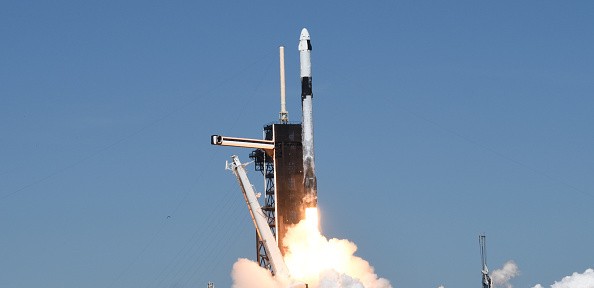
A new US GPS navigation satellite was successfully launched into orbit on Wednesday, Jan. 18, at 7:24 AM EST (12:24 GMT). A SpaceX Falcon 9 rocket blasted the satellite off from Cape Canaveral Space Force Station in Florida, according to a Space.com report.
So far this year, SpaceX has successfully launched four rockets.
Falcon 9's first-stage rocket was reused for the GPS satellite launch after it carried NASA's Crew-5 astronauts Nicole Mann and Josh Cassada, Japan's Koichi Wakata, and Russia's Anna Kikina to the International Space Station (ISS).
Rocket Launch
About 2 minutes and 40 seconds after lifting off from Space Launch Complex 40 at Cape, the first stage successfully separated from the upper stage carrying the cargo. It then returned to Earth and landed on SpaceX's floating platform named "A Shortfall of Gravitas" 8 minutes and 40 seconds after launch.
The fairing, which shielded the cargo during the rocket's first ascent, will be collected from the Atlantic Ocean and examined by SpaceX for potential reuse, according to the launch webcast.
The Satellite
When the Falcon 9's upper stage separated into its first stage and fairing, the high-tech GPS III Space Vehicle 06 proceeded to orbit. Around 1 hour and 30 minutes after liftoff, the satellite was released from the upper stage at the height of approximately 2,670 miles (4,300 kilometers) above the Earth's surface.
The Amelia Earhart satellite, named after the first woman to fly alone across the Atlantic Ocean, will now go independently to its operational orbit 12,500 miles (20,200 km) above Earth.
The sixth satellite in the GPS III series, Amelia Earhart, will join the Neil Armstrong-named last satellite in the series in June 2021.
The US Space Force owns and operates the satellite as part of a broader initiative to upgrade the country's GPS system. Lockheed Martin, the manufacturer, claims the new satellite will have a 15-year lifespan and be included in a constellation of 32 subsequent-generation satellites.
Sophisticated GPS System
In order to better meet evolving mission demands and emerging threats, Lockheed Martin has announced that the newest generation of GPS satellites is up to three times more accurate and eight times more equipped to counteract jamming. It reportedly has a new modular architecture that can be easily modified, too.
The firm estimates that four billion people throughout the globe utilize GPS for mobility, precision agricultural monitoring, and utility infrastructure (some of which uses GPS in part to pinpoint service areas).
However, the US GPS network is not the only accessible constellation of navigation satellites.
Europe has its own separate system known as Galileo; Russia has GLONASS; and China has its own different server known as Beidou.
Since Russia invaded Ukraine in February 2022, GPS independence has often been brought up as a question of national sovereignty and security.
Also Read : NASA Scientists Spot Flashes from the Sun that May Help Them Predict the Next Solar Flare

ⓒ 2026 TECHTIMES.com All rights reserved. Do not reproduce without permission.




